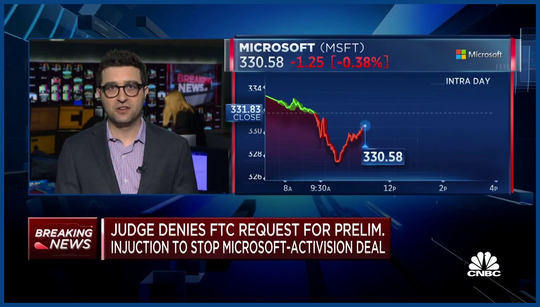Microsoft secures Activision Blizzard deal after court battle
A court case regarding Microsoft's acquisition of Activision Blizzard has concluded in the Xbox owner's favor, securing the deal and its potential impact on the Call of Duty landscape.
The ruling dismisses Sony concerns about unfair competition and the potential for Microsoft to make the FPS game exclusive to Xbox and PC.
The ruling comes after a lengthy court battle, with Microsoft and Activision Blizzard both seeking to push through the multi-billion deal. It also follows concerns from Sony that the merge would result in missed profits and a loss of exclusivity for Call of Duty, with the FPS series evolving from a console-exclusive franchise to a live service game with cross-platform availability.
In a summary judgment, the judge ruled unanimously in favor of Microsoft, dismissing claims of unfair competition and dismissing Sony's concerns over lost profits and exclusivity.
"The government's concerns are not significant enough to block the acquisition," the judge says. "The government has identified no basis for blocking the merger that would be sufficient to meet the statutory standard."
The judge also discussed Call of Duty and its place in modern gaming, with Microsoft's potential to make the series exclusive to Xbox and PC a point of contention.
"Activision's consistent returns rely in part on the success of the Call of Duty series," the judge says. "This series also provides regular content updates to keep players engaged. Call of Duty has evolved from being a console-exclusive franchise to a live service game with cross-platform availability."
This change has been a point of worry for Sony, which fears Microsoft will use the merger to make Call of Duty an Xbox and PC exclusive. However, the judge dismisses these concerns, saying that Activision Blizzard relies on the series for consistent returns and regular content updates to keep players engaged.
"There is no claim that Sony's concerns are based on anything other than fear of what Microsoft might do with its newfound power over Call of Duty," the judge says. "That is not enough to block the deal."
The ruling also highlights the shift to a live service model and the rise of other cross-platform games like Destiny and Fortnite, which makes exclusivity arguments surrounding a single game like Call of Duty less relevant.
"The gaming industry has changed," the ruling continues. "Whereas once the exclusive landscape was dominated by a single game like Call of Duty, the success of the merger will not be determined solely by Call of Duty."
The ruling also comes after a period of uncertainty regarding Microsoft's motivations, with the Xbox owner's current stance likely influenced by its desire to push the deal through. However, the long-term implications should be considered, with the deal set to be one of the biggest acquisitions in gaming history.
The ink has yet to dry on the deal, and its true impact will only be seen once it is finalized. However, the ruling provides a fascinating look at the changing landscape of the medium, with exclusivity discussions that fail to consider the broader implications of the changing landscape of gaming.
Check out our guide to all the latest Call of Duty cards and codes. You can also take a look at other best multiplayer games, which may be set to change with the arrival of the multiplayer juggernaut that is CoD.















